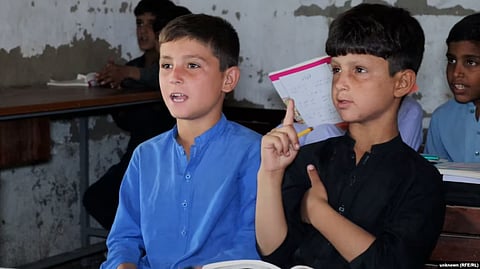
- Home
- NewsGram USA
- India
- न्यूजग्राम
- World
- Politics
- Entertainment
- Culture
- Lifestyle
- Economy
- Sports
- Sp. Coverage
- Misc.
- NewsGram Exclusive
- Jobs / Internships

Students at an Afghan refugee camp near Peshawar in northwest Pakistan are worried about what comes next for them if they are forcibly repatriated to Afghanistan.
RFE/RL's Radio Mashaal met students at a school in the Khazana Refugee Camp on the outskirts of Peshawar.
The camp was established in the late 1970s and has housed thousands of Afghan families fleeing decades of conflict in Afghanistan.
Afghans had until August 31 to return to Afghanistan or face forcible return.
"My grandfather migrated here. I was born in the Khazana [refugee] camp. I'm in fifth grade here," says student Salaman Khan. "Moving to Afghanistan at this stage will affect my studies. Also, it's not possible to immediately enter another school [in Afghanistan] after leaving here."
Many families returning to Afghanistan from Pakistan have said they have been unable to enroll children in schools, because they did not have the necessary documents to register them.
The Taliban has meanwhile waged a war on all forms of modern secular education, which thrived in Afghanistan after the US-led invasion in 2001.
Since regaining power in 2021, the hard-line Islamist group has converted scores of secular schools, public universities, and vocational training centers into Islamic seminaries, leading to a surge in the number of madrasahs in the country.
The Taliban-run madrasahs promote extremist religious instruction, raising fears that it could radicalize a new generation of Afghans.
Shakil Arshad, who teaches students in the refugee camp, is worried about what will become of the children here.
"The curriculum we teach here [in Pakistan] creates a serious challenge for these students [moving to Afghanistan]. The [Taliban] government should find a solution -- for example, providing additional tuition centers for them so that they don't miss a year of their education."
The United Nations says more than 1.2 million Afghans, including many children, have moved to Afghanistan since Pakistan launched a 2023 crackdown.
Refugees have reported police raids and harassment by the Pakistani authorities.
(RFE/RL/NS)
Also Read:
